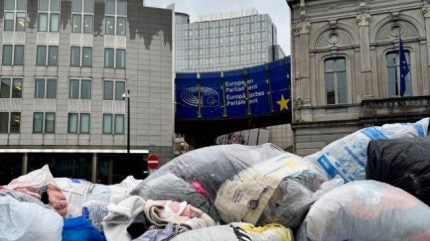
The European Parliament describes the launch of its Sustainable Textile Working Group as a significant step towards ensuring a fair and circular transition for the textile sector.
The event to launch the initiative was co-hosted by MEPs Saskia Bricmont, Barry Andrews, and Lara Wolters. It also brought together a coalition of civil society organisations to discuss environmental and social priorities within the current EU mandate.

Discover B2B Marketing That Performs
Combine business intelligence and editorial excellence to reach engaged professionals across 36 leading media platforms.
The coalition, which includes the Changing Markets Foundation, Clean Clothes Campaign, ECOS, European Environmental Bureau, Fair Trade Advocacy Office, Fashion Revolution, and industriAll Europe, have expressed their commitment to collaborating with the new group.
It aims to address the unprecedented challenges faced by textile reuse and waste management actors and to advocate for the recognition and support of social enterprises leading in textile reuse and recycling.
As the working group starts its activities, there is a sense of urgency to engage in discussions on specific measures that can advance a more circular textile sector.
The coalition is eager to work alongside MEPs to push for urgent measures that will support social and circular enterprises active in textile waste prevention and management to ensure these key actors receive the necessary backing to make a meaningful impact.

US Tariffs are shifting - will you react or anticipate?
Don’t let policy changes catch you off guard. Stay proactive with real-time data and expert analysis.
By GlobalDataEarlier this year, social and circular enterprises such as RREUSE, Ressources, Emmaüs Europe, and TESS GEIE staged a demonstration in front of the European Parliament, demanding urgent EU action to address the textile waste crisis.
RREUSE processes 337,000 tonnes of textiles per year and facilitates local reuse of 47,000 tonnes.
Last month, the European Commission (EC) welcomed new rules to measure the environmental impact of clothes and shoes.
The rules introduce a science-based and impartial method to evaluate the environmental impact of clothing and shoes across their entire lifecycle, from raw material extraction, production and logistics to use and end-of-life.
In April 2025, the EC issued a draft regulation to restrict the use of nonylphenol ethoxylates in textile articles.





